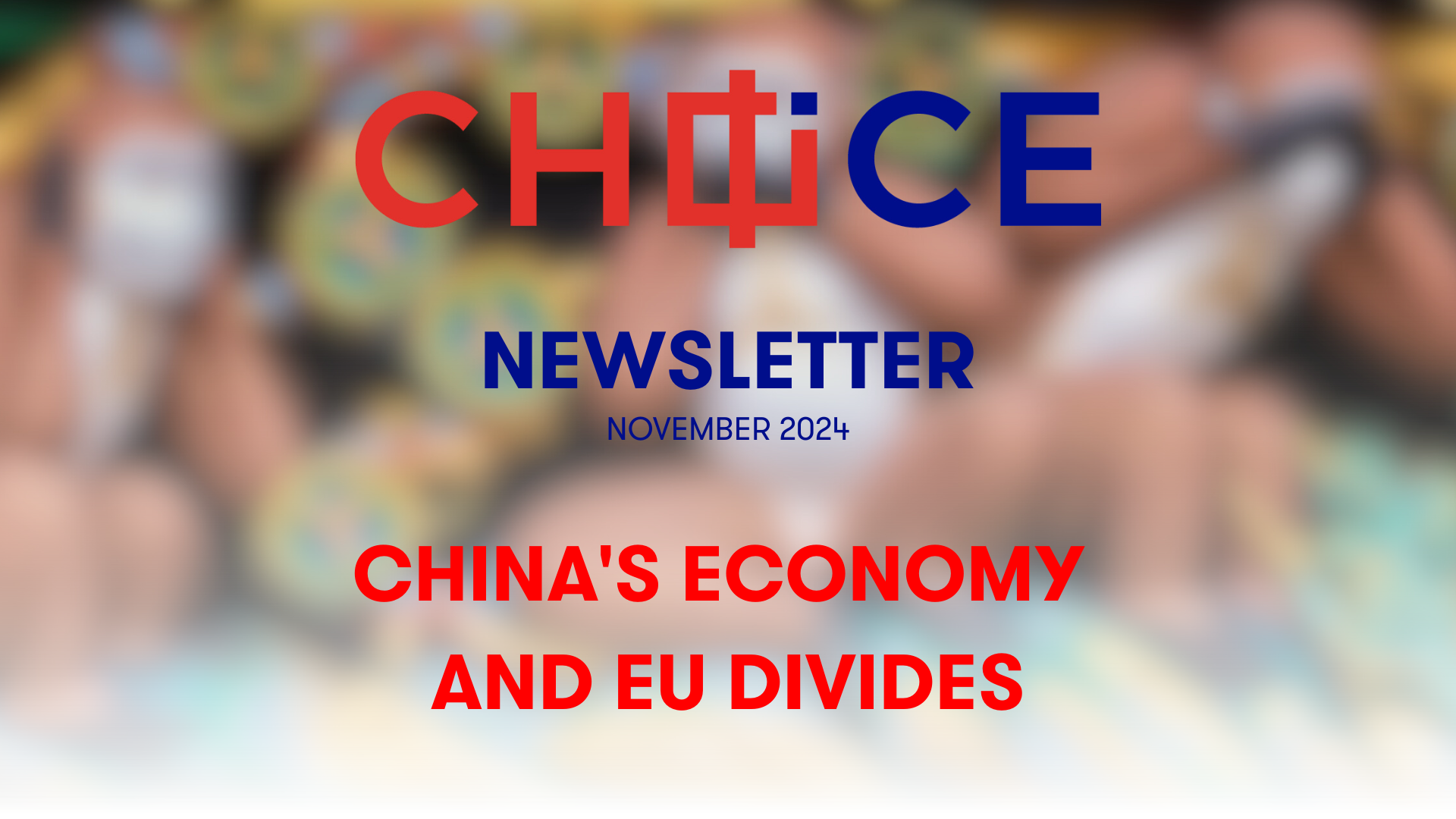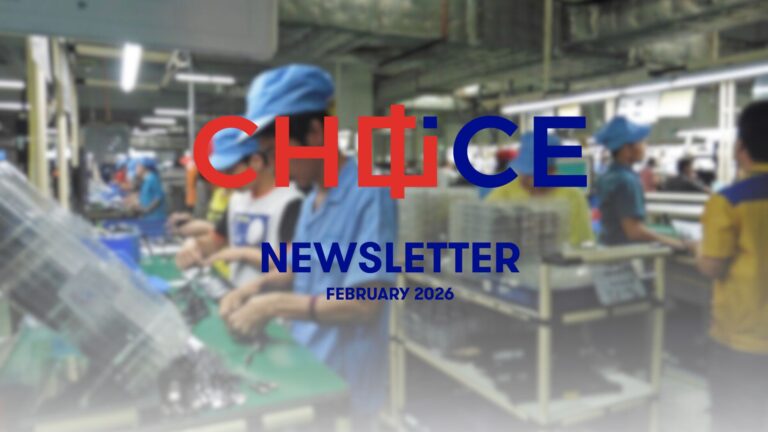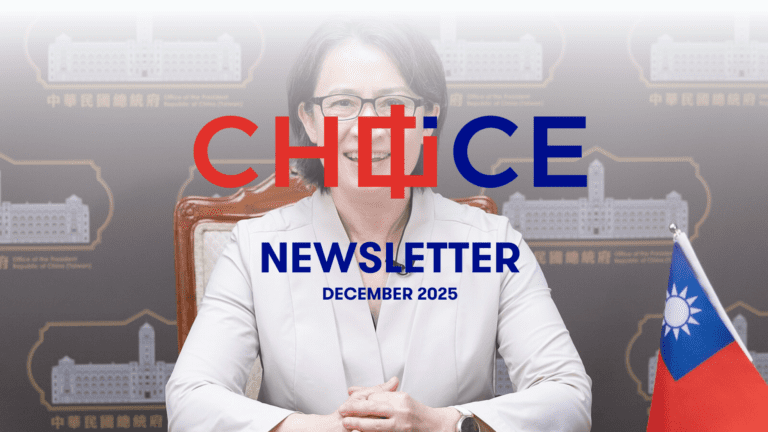CHOICE Newsletter: China’s Economy and EU Divides

Dear Reader,
Welcome to our latest newsletter! This month, our team delves into Robert Fico’s ongoing visit to China, a trip he has called his most important visit abroad in 2024. Meanwhile, CHOICE has established new partnerships with leading European institutions in China and Taiwan studies, including the Taiwan Research Hub at the University of Nottingham, the China Institute at SOAS, and LSE Ideas at the London School of Economics. These partnerships will expand the reach of our work and further amplify the voices of CEE China experts across Europe. We are also thrilled to announce a collaboration with talented Stellina Chen, a cartoonist whose work has appeared in publications like Le Monde. In this edition, we bring you her first piece for CHOICE. Lastly, we are proud to introduce our new initiative, Women Insight on China (WiCH), which strengthens and promotes the voices of female China analysts in Europe. You can learn more about WiCH and find out how to get involved in our new podcast, linked below. Enjoy reading!
CHOICE Take

A lot has happened during October in China’s economic landscape. After the release of a monetary stimulus package at the end of September, which primarily focused on lowering interest rates, investors are eager to see whether a fiscal stimulus package will follow. More importantly, they are curious about the size of such a package that has been promised to address some of the long-standing issues in the Chinese economy – from local government indebtedness to the struggling real estate market – while leaving other structural issues, such as the historically low consumption, largely unaddressed. As China continues to rely on investment and exports for its economic growth, the EU’s decision to impose final tariffs on imported Chinese EVs marked a major development.
The tariff decision followed a divided vote among member states on October 4, which was preceded by a last-minute push from both China and Germany to influence other members to vote against the tariffs. In the end, ten countries (including the Baltic states) voted in favor, twelve abstained and five voted against. While several countries (including Germany) have reversed their initial positions since the non-binding vote on July 15, the motion to impose tariffs of up to 45% on Chinese EVs for a minimum of five years was passed.
The decision represents the bare minimum needed for the EU to protect its domestic automotive industry while continuing to pursue its dual (i.e., green and digital) transitions. Unless it is followed by other – more substantive – measures, the tariffs are unlikely to inflict any major harm on Chinese EV manufacturers. Moreover, the vote itself highlights internal divisions within the EU that Beijing may seek to exploit further.
All V4 states voted as they did in July: Czechia abstained, Poland voted in favor, and Slovakia and Hungary voted against. Similar to Germany, Slovakia’s vote was largely influenced by concerns about potential Chinese retaliation, especially against large-engine vehicles, where Germany and Slovakia account for a significant portion of European exports to China. The Slovak government’s stance was supported by the Slovak Electric Vehicle Association (SEVA), which repeated concerns about possible retaliation against German and British SUV models produced in plants in Bratislava and Nitra.
Interestingly, the newly elected Labour government in the UK has also expressed its intention not to follow the EU and US examples of imposing tariffs, seeking an alternative solution instead – though it remains unclear what this alternative might entail. As the British Foreign Secretary David Lammy concluded his trip to China, during which he sought to establish more pragmatic relations with Beijing, attention turned to the Chinese trip by the Slovak Prime Minister Róbert Fico. The latter emphasizes pragmatism while critiquing the more hawkish approach of the previous Slovak government in dealing with China.
As Fico continues to emphasize that the anti-tariff vote was a mistake, and with plans to discuss the Chinese battery project in Šurany during his trip to China, it will be interesting to see what the outcome of this visit will be. Is Fico genuinely committed to adopting Hungary’s approach toward China? And will China seek to exploit the growing divisions within the EU? These are the key questions to watch.
By Dominika Remžová, CHOICE Analyst
Taiwan in Focus
Taiwan’s diplomacy and visibility: after Europe, time to focus on Africa
Every new government in Taiwan faces the same challenge: how to gain more international visibility and retain its few official diplomatic allies, as China tries to lure them away with promises of investment and loans. Lai Ching-te, who took the presidential office for the Democratic Progressive Party (DPP) in May, received a boost of support from Brussels this October when the European Parliament officially called into question Beijing’s interpretation of the United Nations Resolution 2758 from 1971. This resolution gave the China seat to Beijing, although it does not explicitly state that Taiwan could not be a UN member under a different name. Beijing, nevertheless, claims that the resolution excludes any membership for Taiwan, which it regards as its territory.
At the same time, Taiwan should not limit its attempts to increase its international space to Europe: Africa, where Taipei has only one official ally left – Eswatini – represents another opportunity for increasing Taiwan’s visibility. While challenging the unwavering support of over 50 African states for China, particularly in UN votes, is unlikely to succeed overnight, winning the hearts and minds of African public and key elites could lay the groundwork for a long-term shift in African perceptions of Taiwan.
A bitter reminder of Taipei’s lack of official allies is unfolding as South Africa requested Taiwan to relocate its representative office outside its capital Pretoria, following Nigeria that took similar action in 2017. Moreover, given the very uncertain outcome of the upcoming US elections, and their potential implications for the Indo-Pacific region, Taiwan will need to bolster all tracks of its official and grassroot diplomacy to counter Beijing’s narratives.
By Filip Noubel, CHOICE Analyst (based in Taipei)
CHOICE News
 CHOICE team visited Brussels to meet with our European stakeholders. During their visit, Ivana Karásková, Dominika Urhová and Filip Noubel also met with the former Taiwan president Tsai Ing-wen (see our post on X).
CHOICE team visited Brussels to meet with our European stakeholders. During their visit, Ivana Karásková, Dominika Urhová and Filip Noubel also met with the former Taiwan president Tsai Ing-wen (see our post on X).
 Filip Noubel provided an interview to the Slovak TV JOJ about the significance of China’s recent military exercises near Taiwan, which Beijing framed as a warning against separatist moves by Taipei (listen to the interview here).
Filip Noubel provided an interview to the Slovak TV JOJ about the significance of China’s recent military exercises near Taiwan, which Beijing framed as a warning against separatist moves by Taipei (listen to the interview here). Dominika Remžová has provided a commentary for Pravda.sk on the topic of Slovak Prime Minister Róbert Fico’s visit in China (read here).
Dominika Remžová has provided a commentary for Pravda.sk on the topic of Slovak Prime Minister Róbert Fico’s visit in China (read here).  Ivana Karásková participated in a study trip on research security organized by the British Embassy in Prague. As the sole representative from a Czech think tank among ministry and academic stakeholders, Ivana contributed her insights on balancing international collaboration with research protection during closed-door discussions in the UK (see our post on X).
Ivana Karásková participated in a study trip on research security organized by the British Embassy in Prague. As the sole representative from a Czech think tank among ministry and academic stakeholders, Ivana contributed her insights on balancing international collaboration with research protection during closed-door discussions in the UK (see our post on X).
 We’re on Bluesky! Stay updated with our latest articles, insights, and news by following our account – don’t miss out on valuable content and updates. (follow us here)
We’re on Bluesky! Stay updated with our latest articles, insights, and news by following our account – don’t miss out on valuable content and updates. (follow us here)
This is the web version of our newsletter. If you’d like to receive the CHOICE newsletter in advance, straight to your inbox, sign up here:
Written by
CHOICE
CHOICE is a multinational consortium of experts providing informed analysis on the rising influence of the People’s Republic of China within the countries of Central and Eastern Europe (CEE).


